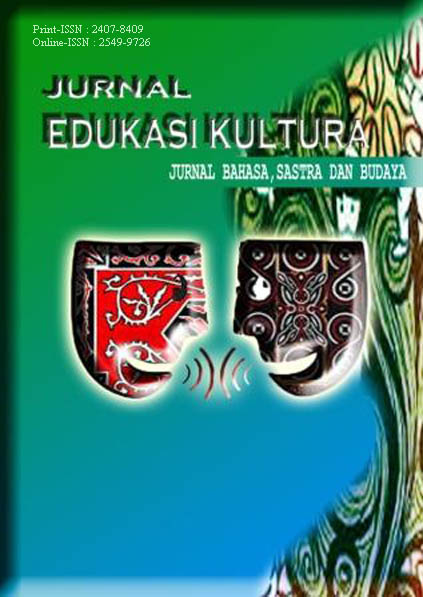Penerapan Metode Pembelajaran Kontekstual berbasis Kearifan Lokal dalam Matematika: Membangun Identitas Budaya diera Digital
DOI:
https://doi.org/10.24114/edukasikultura.v12i1.66043Abstract
Penelitian ini dimotivasi oleh keterbatasan penelitian terkait integrasi kearifan lokal dalam pembelajaran matematika, meskipun dampaknya signifikan dalam mendukung pembelajaran yang bermakna dan penguatan identitas budaya siswa. Penelitian ini bertujuan untuk mengeksplorasi dan menganalisis penerapan metode pembelajaran kontekstual berbasis kearifan lokal dalam pendidikan matematika, serta dampaknya terhadap hasil belajar dan penguatan identitas budaya siswa di era digital. Penelitian ini mengadopsi desain kualitatif dengan pendekatan studi pustaka, di mana sumber-sumber data diperoleh dari jurnal ilmiah, buku, dan laporan penelitian yang relevan. Temuan menunjukkan bahwa pembelajaran kontekstual berbasis kearifan lokal efektif dalam menjembatani konsep matematika yang abstrak dengan pengalaman konkret siswa, meningkatkan motivasi belajar, dan memperkuat kesadaran identitas budaya. Studi ini menyimpulkan bahwa metode ini memiliki potensi pedagogis dan kultural yang signifikan, serta memberikan kontribusi terhadap pengembangan teori pembelajaran kontekstual dan etnomatematika. Studi ini juga mengidentifikasi peluang penelitian masa depan tentang efektivitas pendekatan ini di berbagai konteks budaya dan pemanfaatan platform digital dalam implementasinya.References
Arisetyawan, A., Taher, T., & Fauzi, I. (2021). Integrating the Concept of Plane Figure and Baduy Local Wisdom as a Media Alternative of Mathematics Learning In Elementary Schools. Kreano, Jurnal Matematika Kreatif-Inovatif, 12(1), 1–13. https://doi.org/10.15294/kreano.v12i1.26288
Creswell, J. W. (2018). Research Design Qualitative, Quantitative, and Mixed Methods Approaches. In Writing Center Talk over Time (5th ed.). SAGE Publications India Pvt. Ltd. B. https://doi.org/10.4324/9780429469237-3
D’Ambrosio, U. (1999). Literacy, Matheracy, and Technocracy: A Trivium for Today. Mathematical Thinking and Learning, 1(2), 131–153. https://doi.org/10.1207/s15327833mtl0102_3
Harefa, D., & Suastra, I. W. (2024). MATHEMATICS EDUCATION BASED ON LOCAL WISDOM : LEARNING STRATEGIES THROUGH HOMBO BATU. AFORE: Jurnal Pendidikan Matematika, 3(2), 1–11. https://jurnal.uniraya.ac.id/index.php/Afore/article/view/2236/1357
Hudson, C. C., & Whisler, V. R. (2020). Contextual teaching and learning for practitioners. IMSCI 2007 - International Multi-Conference on Society, Cybernetics and Informatics, Proceedings, 2(4), 228–232. https://iiisci.org/journal/pdv/sci/pdfs/e668ps.pdf
Latif, N. S., & Talib, A. (2021). Development of ethnomathematics e-modules based on local wisdom to improve students’ cultural and civic literacy. Advances in Social Science, Education and Humanities Research, 611(ICoESM), 112–120.
Novianti, D. E., & Dewi, N. R. (2022). Local Wisdom as an Ethnomathematics Learning Approach (A study on Regency Local Wisdom). International Conference on …, 142–148. https://proceeding.unnes.ac.id/index.php/ISET/article/view/1741%0Ahttps://proceeding.unnes.ac.id/index.php/ISET/article/download/1741/1227
Nursyahidah, F., Anindya, F. M., Yulianti, M. A., Prisanto, Z. I., & Rosario, M. A. R. (2025). Integrating Local Wisdom with Technology: Designing Learning Trajectory of Cylinder through Realistic Mathematics Education Approach. Mathematics Education Journal, 19(1), 81–98. https://doi.org/10.22342/jpm.v19i1.pp81-98
Putri, H. R., & Ekawati, R. (2019). The Development Of Mathematics Handout Based On Local Wisdom Nuanced For Secondary Students. Jurnal Riset Pendidikan Dan Inovasi Pembelajaran Matematika (JRPIPM), 2(2), 93. https://doi.org/10.26740/jrpipm.v2n2.p93-102
Rachman, A., Hanla, Yochanan, Samanlangi, A. I., & Purnomo, H. (2024). Metode Penelitian Kuantitatif, Kualitatif, dan R&D (Issue January). https://www.researchgate.net/publication/377469385_METODE_PENELITIAN_KUANTITATIF_KUALITATIF_DAN_RD
Samrin, S., Riansyah, F., Patih, T., Tarty, I. P., & Nastiti, D. K. (2023). Enhancing Mathematical Interest and Learning Outcomes: The Lift-the-flap Book Incorporating Tolaki Local Wisdom and Islamic Values. Tadris: Jurnal Keguruan Dan Ilmu Tarbiyah, 8(1), 33–47. https://doi.org/10.24042/tadris.v8i1.14206
Situmorang, R. P., Suwi, E., & Nugroho, F. A. (2019). Contextual Learning: Implementation and Challenges for Science Teacher in Private Middle School. Jurnal Penelitian Dan Pembelajaran IPA, 5(1), 26. https://doi.org/10.30870/jppi.v5i1.3881
Trisna, B. N. (2019). Education 4.0 Perubahan paradigma dan penguatan kearifan lokal dalam pembelajaran matematika. Math Didactic: Jurnal Pendidikan Matematika, 5(1), 83–92. https://doi.org/10.33654/math.v5i1.519
Yuliani, A. M., & Irham, M. (2022). Development of Sumbawa Local Wisdom-Based Mathematics Module. Kreano, Jurnal Matematika Kreatif-Inovatif, 13(1), 151–162. https://doi.org/10.15294/kreano.v13i1.33166
Published
How to Cite
Issue
Section
License
Copyright (c) 2025 Nadhilah Nazwa, Desi Sri Kelengna Surbakti, Anggita Uli Angel Gultom, Elvi Mailani

This work is licensed under a Creative Commons Attribution 4.0 International License.

This work is licensed under a Creative Commons Attribution 4.0 International License
Authors who publish with this journal agree to the following terms:
- Authors retain copyright and grant the journal right of first publication with the work simultaneously licensed under Creative Commons Attribution 4.0 International License that allows others to share the work with an acknowledgement of the work's authorship and initial publication in this journal.
- Authors are able to enter into separate, additional contractual arrangements for the non-exclusive distribution of the journal's published version of the work (e.g., post it to an institutional repository or publish it in a book), with an acknowledgement of its initial publication in this journal.Penulis.
- Authors are permitted and encouraged to post their work online (e.g., in institutional repositories or on their website) prior to and during the submission process, as it can lead to productive exchanges, as well as earlier and greater citation of published work (Refer to The Effect of Open Access).



